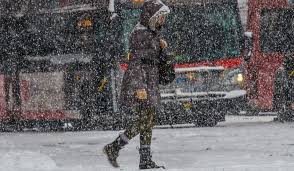 With the cold weather here, below are some tips to prevent Hypothermia.
With the cold weather here, below are some tips to prevent Hypothermia.
Wear warm, insulating clothing in cold weather.
Hypothermia occurs when body temperature drops below 95°F (35°C). This is most often due to prolonged exposure to cold. Hypothermia is very serious. It can be fatal if not treated.
Here are some tips for preventing hypothermia
- Maintain proper heating in your home, especially at night. Set the thermostat to 68° to 70°F. Ask the doctor to refer you to home safety resources if needed.
- Dress for the temperature. If it’s cold, wear as many layers of loose-fitting clothing as needed to stay warm. If you’re indoors, use extra blankets or a sleeping bag for added warmth. If you’re outdoors, keep your head and neck covered with a hat and scarf. Wear a coat or jacket that protects against the wind and rain. Also, protect your hands with gloves or mittens and your feet with socks and boots and try to stay dry.
- Always check the weather before you go out. Be prepared in case you get stranded in cold weather. Keep first aid kits, packaged and canned food, and dry blankets and clothing in your car. When swimming or boating, have these same emergency supplies. Also have rescue items, such as life jackets, on hand.
- In an emergency, drink cold water instead of ice or snow.
- Eat enough food daily. When you’re cold, your body uses up more calories. Also, you need to maintain some body fat for your body to stay warm.
- Limit the amount of caffeine or alcohol you drink when it’s cold. These cause your blood vessels to widen, which can lower your body temperature. Also, alcohol can affect your ability to tell if you are getting too cold.
- Check with the doctor whether certain health problems you have or medications you take can affect your body temperature. You may need to take extra steps to protect yourself from hypothermia.
- If you do outdoor cold-weather sports or activities, always do so with another person. Wear multiple layers. If clothing gets wet, go indoors and remove wet items as soon as possible. And be sure to get enough food and rest to help your body be ready to protect itself against cold.
- Never use a gas range or oven to heat a home.
- Never use a charcoal grill, hibachi, lantern, or portable camping stove inside your home
Signs of Hypothermia
Call 911 or or get treatment right away if any of the following occurs during or after exposure to cold:
- Body temperature below 95°F (35°C)
- Confusion, slurred speech, or slow or uncoordinated body movements
- Numb, tingly, or blue skin
- Chest pain or trouble breathing
- Slow, fast, or irregular heartbeat
- Lightheadedness or fainting spells
How to Recognize CO Poisoning
The most common symptoms of CO poisoning are headache, dizziness, weakness, nausea, vomiting, chest pain, and confusion. People who are sleeping or who have been drinking alcohol can die from CO poison.
DC SHELTER HOTLINE
The Shelter Hotline is operated by the United Planning Organization (UPO). You can reach the hotline by email uposh@upo.org or calling (202) 399-7093
